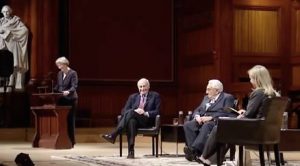Cambridge, Mass — Kissinger Returns to Harvard
ø
Cambridge, Mass. — Returning to Harvard after years of estrangement with his alma mater, former Secretary of State and National Security Advisor Henry Kissinger participated, Wednesday, in a wide-ranging panel discussion of U.S. foreign affairs in Sanders Theatre. Introducing Kissinger, Harvard President Drew Gllpin Faust said he was one of Harvard’s legendary figures
After recounting personal stories about his days as a student and faculty member at Harvard, Kissinger participated in a panel discussions and then took audience questions.

Kissinger returns to Harvard. K. Lee Lerner
Kissinger still stirs passionate debates and conflicting appraisals of his undeniably significant roles in history. He dismissed allegations from the sudience that he committed an array of war crimes — alleged initially by a protestor who interrupted the discussion and subsequently by another audience member who identified himself as a conscientious objector to the Vietnam war. Kissinger physically bristled, urging the questioner and audience to read historical primary source records. Kissinger said documentary records prove allegations he committed war crimes are based on numerous factual inaccuracies.
The former Secretary of State and National Security Advisor still stirs passionate debates and conflicting appraisals of his undeniably significant roles in history.
Kissinger ’50, PhD ’54, L ’55; Faculty ’54-69; was initially admitted to Harvard as a 24-year-old sophomore after his service in WWII. Kissineger said he applied to ten colleges, but was accepted only by Harvard. “Not based on merit,” said Kissinger, “but because I applied late, not completing my application until May of the year I wished to enroll. Kissinger arrived at Harvard with a bronze star, experience in the counter-intelligence corps, and cocker spaniel he managed to keep in the dorms despite prohibition against pets. He went on to distinguished academic career as a student, graduate student, and then professor at Harvard. He served as National Security Advisor for both Presidents Nixon and Ford from 1969 to 1975 and then Secretary of State from 1973 to 1977.
Joining Kissinger in the panel discussions were professors Joseph Nye Jr, and Graham T. Allison along with doctoral student Jessica Blankshain.
During a wide-ranging discussion, Kissinger said reality demands politics “balance risks against opportunities” and that “Anyone in high office wants to contribute to peace” but realities and complexities intrude.
After recounting meetings with Mao Tse-tung, Kissinger he said Mao put his people through unbelievable suffering, but was also a far-seeing strategic thinker. Kissinger said Mao had a messianic and commanding personality, Meetings were always unscheduled and Mao always started with question. Mao was formidable.
As an aside Kissinger said that the “CIA issued a report saying that Mao would never open relations just two months before he did.”
Nye asks if Kissinger refutes the concept that U.S. conflicts with China are inevitable.
Kissinger said, “Long periods of peace possible but rising powers inevitably confront status quo powers.”
Kissinger said, “It is essential that the United States and China recognize the necessity to handle some issues, especially environmental and weapons proliferation, on global basis. In a subsequent answer to an audience regarding China, Kissinger said, “there is a chance over 20 years that cooperation can develop. It must be a joint effort. China today is very different than under Mao.”
Later Kissinger told Allison of his distain for the terms realism and idealism with respect to politics. Kissinger said, “Reality and values both have roles.”
The key challenge in diplomacy was always to ask, “Is this best that can be done?” said Kissinger, “I had clearly formed strategic views” but “doing best you can do is not always best that can be done.”
Kissinger also admired Egypt’s Anwar el-Sadat, recounting his troubled shuttle diplomacy and how Sadat faced internal resistance which he labored to overcome.
During shuttle diplomacy, to keep his own position Kissinger said he delivered messages only once to leaders. As a matter of tactics, Kissinger said that, ” when in office you have to act as if you are sure what you are doing. You don’t get rewarded for doubts.”
With regard to Vietnam, Kissinger says he believes had the United States stayed united on Vietnam, a better outcome could have been obtained for all.
Regarding Russia, Kissinger said, “Russian President Putin responds to multiple strategic and demographic pressures caused by Russian nationalism.” Kissinger says he does not think US can fundamentally influence Russian internal politics and advises against U.S. meddling
Again challenged by an audience member about his role in the Vietnam War, Kissinger dismissed the questioner by saying the questioner’s statements contained massive inaccuracies. Kissinger asked the audience to read the primary source records. “No one had bigger interest in ending war,” said Kissinger.
Kissinger also denied knowledge of U.S. involvement In the overthrow of the Allende government in Chile. Kissinger also denied an allegation that while on faculty at Harvard he secretly released student records to the FBI.
Kissinger declined to answer the question.


